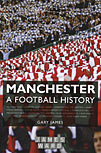 A Football History
A Football History
by Gary James
James Ward, £21.95
Reviewed by Joyce Woolridge
From WSC 258 August 2008
Gary James’s ambitious aim is to tell the history of football in the Manchester area and thereby establish its importance to the city and its environs. The game was banned there 400 years ago because the inhabitants had been “greatly wronged… by a company of lewd and disordered persons… breaking many men’s glass windows at their pleasures and other great enormities”. As James points out, the authorities have not always been sensible of the myriad benefits of what became the region’s favourite pastime. You can hear James’s exasperation as he writes: “It says much about how the early history of football has been viewed in Manchester that the only plaque commemorating the history of [Manchester] City is actually incorrectly positioned.”
This is a heavyweight volume – literally, as it spans 512 closely packed pages, handsomely illustrated with rare photographs and terrific facsimile documents: newspaper clippings, pages from programmes, correspondence etc. One of them is a brief, typed circular letter from December 1972 on Manchester United official notepaper. Addressed to all secretaries of First and Second Division clubs, it informs them that United are prepared to receive offers for the transfer of “G Best, age 26, forward”.
The book has two parts: the first is a chronological narrative; the second deals with specific topics such as the region’s involvement in European football, Football League elections, grounds, the media, managers and various cups. There is some repetition, but this is deliberate as the intention is that each chapter can be read in isolation.
James spent ten years researching the book, trawling the archives of libraries and clubs, and by looking again at original material has uncovered much that was not previously known and corrected errors that have become accepted fact. Curiously, many of these misapprehensions appear to be ones that give United some sort of precedence over City. Indeed, by one computation in the managers’ section, James suggests City’s Sam Cowan was the region’s most successful manager ever, as the Blues won the Second Division title in his sole season in charge.
In the chapters on the origins and the initial decades of football in Manchester, there are the stories of the many local clubs which did not survive or failed to achieve League status, often more by accident than design. Some early matches were chaotic. In one March 1889 encounter between Bury and Denton where the refereeing decisions had been decidedly suspect, one of the captains appealed to the ref for fair play. As the newspaper report put it: “This was met with a challenge from the official to step into the next field and sort it out.”
Inevitably, this history will appeal more to Greater Mancunians of all allegiances than it might to those born elsewhere. It is also not for those looking for a bit of light holiday reading. However, it is a real achievement and the first time the history of the game in the region has been told.
The pleasure I have received from reading this book has left me morally obliged to do my first ever review.
Whilst I will attempt to wax lyrical, a little story first that will probably be more convincing in its way than any words of praise that I can muster:-
Although a Manchester City fan, I joined a coachful from our pub to go and give Stockport County a cheer in their play-off game at Wembley against Rochdale. The coach was a fair mix of County (obviously), City and United fans.
I took Gary James's book to while away the journey. Suffice to say that others took an interest in it and were blown away with the 'differentness' of it. By the time we returned, I'd taken a total of 11 orders for copies!
The book clearly has a 'wow' factor. I think one of its main qualities is the author's refusal to merely compartmentalise each Manchester club's history. Instead it is largely chronological and dwells many times on the relationships between clubs rather than just significant events in their individual past. Whilst United and City inevitably figure prominantly, there is due credit given to the likes of Bury who were Manchester's first truly successful club. At the other extreme, newcomers FC United are given respect for their efforts to return affordable football to the grassroots supporter. In between, every club from the area has its roots explained and its triumphs and tribulations related accurately and entertainingly.
One of my favourite sections is the rise and unfortunate demise of Manchester Central FC. If United and City had not combined and connived to keep this fledging club out of the League in the late'20's / early '30's, then either there would have been three city centre teams or an ailing United could have gone to the wall.
Gary James has researched so deeply that many errors have been found in clubs' official histories. Whilst such fine detail is to be commended, the narrative never lapses into a tedious list of dates that only the 'anorak' would appreciate.
Instead it flows and has you wondering what happened next, even when on some occasions you were fairly sure you knew your football history.
As the guys on the coach found, this is a 'once seen – must have' book and I for one will be buying several more copies, as I have absolutely no doubt that as a Christmas or birthday present it will be received with total delight.
Dave Miller